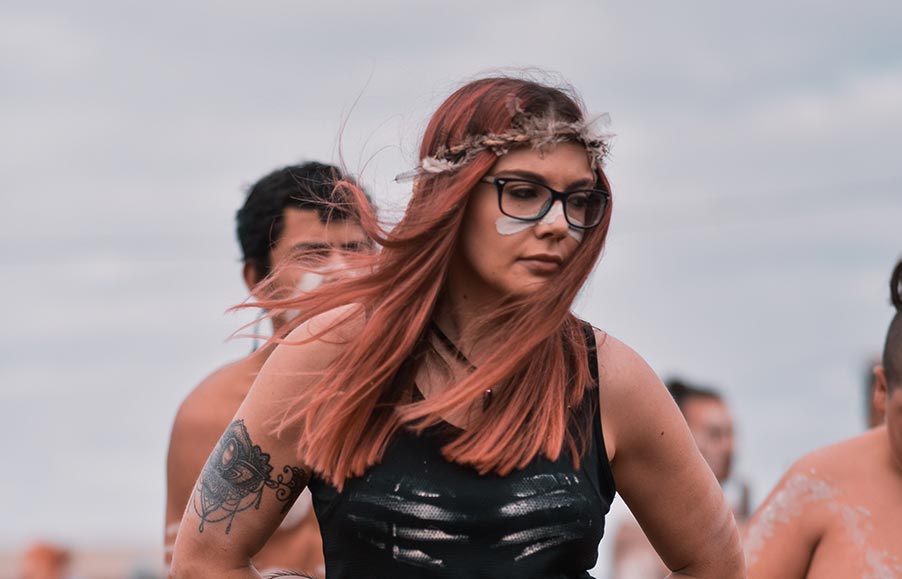- Leticia Anne Designs
From AbSec.org.au

Leticia Quince is a 23-year old Aboriginal woman from Narrandera and is currently based in Dubbo. She works with Uniting as a Youth Development Coach in the Extended Care Program Pilot.
In this role she supports young people, including Aboriginal young people, between 15 and 21 years of age in the foster care system. She helps them to achieve their goals and aspirations, assisting with their progress to independence and a sense of identity.
She is also studying Graphic Design at university and has started up her own design business. She aspires to help young people set up their own businesses to achieve their future goals.
Behind her current success and sunny smile lie painful memories of family separation and a disconnection from Aboriginal kin.
Leticia was removed from her parents when she was 12 years old, along with five younger siblings. She has clear memories of the devastating moment her family was torn apart. As an older child, she could also understand the problems with the NSW child protection system.
Protocols of the Aboriginal and Torres Strait Islander Child Placement Principle were not properly followed by Department of Communities and Justice (DCJ) case workers. Despite expressing her wishes to be placed with extended family, she was ignored.
Leticia and one of her brothers were placed with the same non-Aboriginal foster carer. Two other siblings were placed with another non-Aboriginal carer, and two sisters were placed with an Aboriginal carer.
After six months, the two sisters with the non-Aboriginal carer went to live with Leticia and her brother. With four of the siblings reunited, Leticia settled into life in foster care. Yet there remained a yearning to know more about her Aboriginal identity and origins. Unfortunately for Leticia and her siblings, the cultural plan to keep them connected to Aboriginal culture and kin was inadequate. It did not support their cultural needs, their identity, and only contained a tokenistic idea of attending a NAIDOC Week event every year.
“A lot of young people in care miss out on experiencing Aboriginal culture. As much as I love my foster mum, there was little cultural planning. She did not receive the support to implement it. She does not have the connections in Aboriginal communities,” explains Leticia.
“I would ask myself: ‘Who am I?’ I did not know where my mob was from until I was 18. I had to do all the family research myself. I can’t just walk into an Aboriginal community and be accepted. One of my relatives, my great aunty, was able introduce me, but she sadly passed away.”
Leticia is a staunch advocate for young Aboriginal people, and she credits the AbSec Youth Ambassador Program (YAP) for giving her the confidence to speak out, as well as a connection to Aboriginal culture at a crucial time in her journey into adulthood.
“The YAP provides a vital platform for Aboriginal young people in out-of-home care to have their voices heard,” she states. “AbSec has been a major part of my journey to reconnect with Aboriginal culture.”
Leticia joined the YAP when it started in 2015 and was provided with numerous face-to-face opportunities to develop professional skills in public speaking and networking.
She represented young people at a Round Table Meeting about Aboriginal children in the child protection system with the NSW Minister for Families and Community Services. The Ambassadors also did media training with Andrew Johnson from the Advocate for Children and Young People (ACYP). The Ambassadors visited other organisations, such as the Redfern Community Centre. Leticia also co-hosted a Sorry Day event at the Redfern Community Centre in 2016.
She fondly remembers a cultural gathering at Jervis Bay, where she learned more about Aboriginal culture through activities such as fishing, camping and hearing dreamtime stories. She was able to take her sister and two students she was tutoring.
For Leticia, seeing her fellow Ambassadors blossom into confident speakers and leaders of the future was one of the most satisfying parts of the YAP. She also gained comfort in connecting with other young Aboriginal people with similar experiences of the child protection system.
The skills and knowledge she gained as part of the YAP have enabled her to be an effective advocate for Aboriginal families in her chosen career.
“I learned a lot about the child protection system in NSW. I have stronger networks and know who to talk to. I have the confidence to challenge the practices of other organisations like the police and Housing NSW. A lot of these organisations don’t fully understand the experiences of young Aboriginal people,” she asserts.
Leticia has not seen much improvement in the NSW child protection system for Aboriginal children and young people. As a result, she will continue to campaign for change and challenge the status quo.
“So much needs to change. There needs to be more Aboriginal carers and more support for Aboriginal kinship care. If they are not able to be the carers, non-Aboriginal carers must be fully supported in cultural planning and meeting the cultural needs of Aboriginal children and young people. Otherwise our kids will grow up without a strong sense of their Aboriginal identity or connection to our people and our Country. This leads to them not knowing who they are, or where they belong.”


